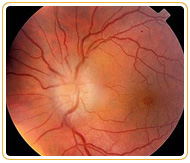Optic Neuritis

Optic neuritis is an inflammation of the optic nerve. The optic nerve allows you to see by carrying images from your retina to your brain. The optic nerve is like a cable of electrical wires or nerve fibers. Each wire carries a part of the visual information to the brain. If some or all of the nerve fibers become inflammed and do not function properly, vision becomes blurred. With optic neuritis, the optic nerve becomes swollen and the nerve fibers do not work properly. Vision can range from near normal to very poor depending on the number of inflammed nerve fibers.
Optic neuritis typically affects young adults ranging from 18–45 years of age, with a mean age of 30–35 years. There is a strong female predominance. Optic neuritis usually occurs suddenly. If you experience any of the symptoms listed above, call your ophthalmologist Various diseases and conditions may cause optic neuritis. In many cases, however, the cause of optic neuritis is not known. The most common etiology is multiple sclerosis. Up to 50% of patients with MS will develop an episode of optic neuritis,The nerve of one or both eyes may be affected. Some people, especially children, develop optic neuritis following a viral illness such as mumps, measles or a cold. Also, inflammation of vessels that nourish the optic nerve and chronic intake of antitubercular drug (ethambutol) can lead to optic neuritis. Blurred vision in one or both eyes (especially after exercising or taking a hot bath), dim vision (as if the lights were turned down) and abnormal color vision (dull and faded colors) are the main symptoms. Pain that is localized behind the eye and associated with eye movements sometimes coexists with this sort of sudden vision disturbances. If you experience one or more of these symptoms, contact your eye doctor for a complete exam.
By looking in the back of your eye with an ophthalmoscope, the physician can see optic nerve swelling.
Other tests such as color vision, side vision, and the reaction of the pupil to light may be performed. Ultrasound or magnetic scanning or visual brainwave recordings may be needed. Optic neuritis may be confused with other causes of poor vision. In most cases, visual functions return to near normal within eight to ten weeks, but they may also advance to a complete and permanent state of visual loss. In these conditions systemic intravenous treatment with corticosteroids may quicken the healing of the optic nerve. When optic neuritis is suggestive of multiple sclerosis (MS) then general immunosuppressive therapy for MS is most often prescribedLast Updated: October 23, 2024



























